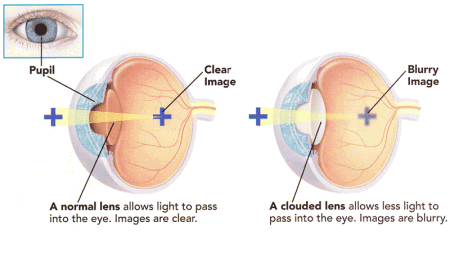What are cataracts?
A cataract is a clouding of the lens of your eye. It is a common occurrence in older patients, and can lead to hazy and blurred vision. Most cataracts are a result of the normal aging process.
What treatments are available?
While the effects of early-stage cataracts may be mitigated with glasses and lighting techniques, only surgery can fully restore your vision. There have been some tremendous advances in the field of cataract surgery in the last five years. We can now replace your natural lens with a clear, plastic intra-ocular lens that can correct and improve your vision.
Advancements in IOL technology now allow for accommodating or bifocal lens implants. These new lenses allow the modern cataract surgery patient to enjoy almost all visual tasks without glasses. Do you often use cell phones, iPads or computers? Do you play sports? Your quality of life may be enhanced by never having to fumble with spectacles again.
Intra-ocular lens implants
There are two main lenses that are approved by the FDA for the correction of presbyopia, the Crystalens, and the Restor lens. The Restor is a diffractive bifocal which divides the light into two focal points, near and far. The Crystalens is an accommodating lens. It is focused by the eyes’ own muscles.
For patients with astigmatism, we offer the Toric lens. While this lens is a monofocal, it can help correct astigmatic cataract patients.
Choosing the best lens for you depends on a number of factors, including the health of your eye and your lifestyle needs. Contact us to schedule an appointment so we can discuss the possibilities.
What is the surgery like?
We have a brand new, state-of-the-art surgical center in the building where all of these procedures are performed. Modern cataract surgery is now performed under topical anesthesia using very small incisions. There is no need for stitches or patches. The patient’s vision is usually good the next day, and the patient may resume normal activities immediately.
So if you are contemplating having cataract surgery, call the office to find out what these exciting new developments could mean for you.
